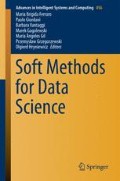Abstract
The idea that the probability of a conditional is the corresponding conditional probability has led something of an embattled existence in philosophy and linguistics. Part of the reason for the reluctance to embrace it has to do with certain technical difficulties (especially triviality). Even though solutions to the triviality problem are known to exist, their widespread adoption is hindered by their narrow range of data coverage and unclear relationship to established frameworks for modeling the dynamics of belief and conversation. This paper considers the case of Bernoulli models and proposes steps towards broadening the coverage of their application.
Access this chapter
Tax calculation will be finalised at checkout
Purchases are for personal use only
Notes
- 1.
Van Fraassen dubbed them “Stalnaker Bernoulli models.” I avoid this label in deference to Robert Stalnaker’s contention that it suggests more credit for him than he deserves (p.c.).
- 2.
Except, that is, for models with no more than two distinct propositions in the domain of the probability distribution. [24] called such models “trivial.”
- 3.
Note that \(V^*(\varphi >\psi )\) is defined with probability 1 if \(P^*(\varphi ) > 0\), and undefined with probability 1 if \(P^*(\varphi ) = 0\). In the latter case, the expectation of the conditional’s truth value is undefined, as is the probability \(P^*(\psi |\varphi )\), at least when defined as the ratio \(P^*(\varphi \wedge \psi )/P^*(\varphi )\). But see [18] for a definition of conditional probability in Bernoulli models which is defined for certain zero-probability propositions on which one might want to conditionalize. ([8, 9] also define the “prevision” for \(\varphi >\psi \) in such a way that it includes the case that the prevision of \(\varphi \) is zero.).
- 4.
I am grateful to two anonymous reviewers for helpful feedback.
References
Adams E (1965) The logic of conditionals. Inquiry 8:166–197
Adams E (1975) The logic of conditionals. Reidel
Bennett J (2003) A philosophical guide to conditionals. Oxford University Press
Ciardelli I, Roelofsen F (2009) Generalized inquisitive semantics and logic. http://sites.google.com/site/inquisitivesemantics/. Accessed Nov 2009
de Finetti B (1935) La logique de la probabilité. In: et Cie H (ed) Actes du Congrès International de Philosophie Scientifique, Paris, Paris, pp IV 1–IV 9
Edgington D (1995) On conditionals. Mind 104(414):235–329
Eells E, Skyrms B (eds) (1994) Probabilities and conditionals: belief revision and rational decision. Cambridge University Press
Gilio A, Sanfilippo G (2013) Conjunction, disjunction and iterated conditioning of conditional events. Adv Intell Syst Comput 190:399–407
Gilio A, Sanfilippo G (2014) Conditional random quantities and compounds of conditionals. Studia Logica 102:709–729
Hájek A, Hall N (1994) The hypothesis of the conditional construal of conditional probability. In: [6], pp 75–110
Hamblin CL (1958) Questions. Australas J Philos 36(3):159–168
Hamblin CL (1973) Questions in montague English. Found Lang 10:41–53
Jeffrey RC (1991) Matter-of-fact conditionals. In: The symposia read at the joint session of the aristotelian society and the mind association at the university of Durham, The Aristotelian Society, pp 161–183, supplementary Volume 65
Karttunen L (1977) Syntax and semantics of questions. Linguist Philos 1:3–44
Kaufmann S (2004) Conditioning against the grain: abduction and indicative conditionals. J Philos Logic 33(6):583–606
Kaufmann S (2005) Conditional predictions: a probabilistic account. Linguist Philos 28(2):181–231
Kaufmann S (2009) Conditionals right and left: probabilities for the whole family. J Philos Logic 38:1–53
Kaufmann S (2015) Conditionals, conditional probability, and conditionalization. In: Zeevat H (ed) Schmitz HC. Bayesian natural language semantics and pragmatics. Springer, pp 71–94
Khoo J (2016) Probabilities of conditionals in context. Linguist Philos 39:1–43
Kratzer A (1981) The notional category of modality. In: Eikmeyer HJ, Riesner H (eds) Words, worlds, and contexts, Walter de Gruyter, pp 38–74
Kratzer A (1991) Conditionals. In: von Stechow A, Wunderlich D (eds) Semantik: Ein internationales Handbuch der zeitgenössischen Forschung. [=Semantics], de Gruyter, pp 651–656
Kratzer A (2012) Modality and conditionals. Oxford University Press
Lance M (1991) Probabilistic dependence among conditionals. Philos Rev 100:269–276
Lewis D (1976) Probabilities of conditionals and conditional probabilities. Philos Rev 85:297–315
Lewis D (1986) Postscript to “Probabilities of conditionals and conditional probabilities”. In: Philosophical Papers, vol 2, Oxford University Press, pp 152–156
McGee V (1989) Conditional probabilities and compounds of conditionals. Philos Rev 98(4):485–541
Mellor DH (ed) (1990) Philosophical papers: F. Cambridge University Press, P. Ramsey
Oaksford M, Chater N (2003) Conditional probability and the cognitive science of conditional reasoning. Mind Lang 18(4):359–379
Oaksford M, Chater N (2007) Bayesian rationality: the probabilistic approach to human reasoning. Oxford University Press, Oxford, UK
Over DE, Evans JSBT (2003) The probability of conditionals: the psychological evidence. Mind Lang 18(4):340–358
Ramsey FP (1929) General propositions and causality. Printed in [28], pp. 145–163
Stalnaker R, Jeffrey R (1994) Conditionals as random variables. In: [6], pp 31–46
van Fraassen BC (1976) Probabilities of conditionals. In: Harper WL, Stalnaker R, Pearce G (eds) Foundations of probability theory, statistical inference, and statistical theories of science, The University of Western Ontario Series in Philosophy of Science, vol 1, D. Reidel, pp 261–308
Author information
Authors and Affiliations
Corresponding author
Editor information
Editors and Affiliations
Rights and permissions
Copyright information
© 2017 Springer International Publishing Switzerland
About this paper
Cite this paper
Kaufmann, S. (2017). Probabilistic Semantics and Pragmatics for the Language of Uncertainty. In: Ferraro, M., et al. Soft Methods for Data Science. SMPS 2016. Advances in Intelligent Systems and Computing, vol 456. Springer, Cham. https://doi.org/10.1007/978-3-319-42972-4_36
Download citation
DOI: https://doi.org/10.1007/978-3-319-42972-4_36
Published:
Publisher Name: Springer, Cham
Print ISBN: 978-3-319-42971-7
Online ISBN: 978-3-319-42972-4
eBook Packages: EngineeringEngineering (R0)

